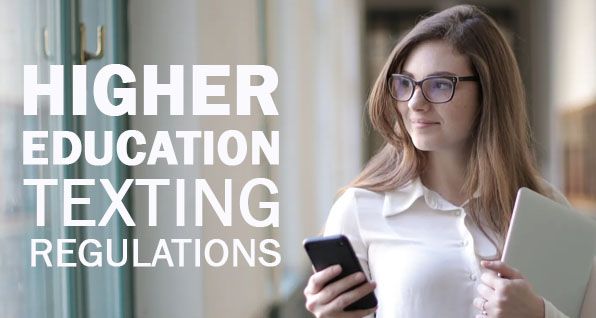

Higher Education Text Messaging: Everything You Need to Know About TCPA Consent Laws
If you’re planning to roll out text messaging for your college or university, it’s essential to understand consent laws before you hit send. Besides avoiding legal issues, understanding the regulations can ensure a positive experience for your students and alumni. We’ve put together a guide that will help you do both.
We will cover the Telephone Consumer Protection Act (TCPA), how it applies to text messaging, and what it all means in a higher education setting. Using our examples and best practices, your school can incorporate SMS texting into its communications strategy with confidence.
What is the Telephone Consumer Protection Act (TCPA)?
The Telephone Consumer Protection Act (TCPA) regulates how telemarketers can contact consumers. It also allows for individuals to file lawsuits for unsolicited calls. Since taking effect in 1991, the Federal Communications Commission (FCC) has revised the rules several times to expand consumer rights and accommodate changes in technology. For example:
- 2003 – Created the Do Not Call Registry, which allows consumers to opt out of telemarketing calls.
- 2012 – Established robocall restrictions, requiring telemarketers to obtain consent before robocalling and offer an opt-out mechanism during the call.
- 2015 – Clarified that text messages are subject to TCPA, just like telephone calls.
Are Non-Profit Colleges and Universities Subject to TCPA?
Technically, no. While the law states non-profit organizations are exempt from TCPA regulations, there are two good reasons to operate under the assumption that your higher education institution could be liable for violations.
- Potential Legal Challenges – The language in TCPA says that the rules don’t apply to “non-telemarketing, informational calls, such as those by or on behalf of tax-exempt non-profit organizations…” However, there’s always the possibility that someone will exploit a loophole, especially if you’re messaging prospective students and it’s perceived as promotional. Private plaintiffs can recover $500 for each call or text in violation of TCPA – and that amount is tripled if it’s a willful violation.
- Best Practices – TCPA is meant to protect the consumer from unwanted solicitations. By following their requirements, your school can develop respectful texting practices, which will build trust and positive engagement with students and alumni. Obtaining their consent is the first step.
Which Types of Texts Must Comply with TCPA?
First, it’s important to clarify that there are four types of texts: marketing, informational, emergency, and hybrid. TCPA has the strictest regulations for marketing messages. Let’s define each type so you can categorize your text messages correctly.
Marketing Texts
If you’re sending a promotional message about a product, good, or service, it’s a marketing text. For example, “20% off all college apparel this week.” However, it’s not always quite that clear. If you plan to use text messaging in college admissions, you might send a text like, “Schedule a tour of our campus.” That could be construed as a marketing text and should be treated as such.
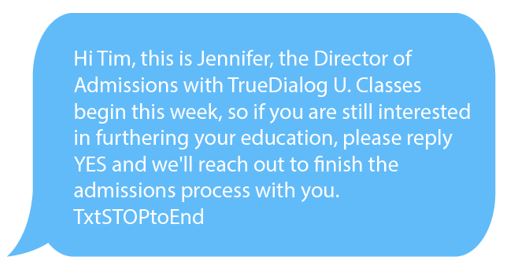
Informational Texts
A message that conveys information about a product, good, or service is an informational (or transactional) text. For example, you might send the following message to an existing student: “Your spring semester tuition is due Friday.” This is a common type of text message sent by colleges and universities.
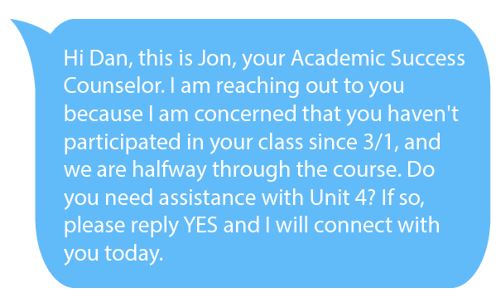

Emergency Texts
If the text notifies recipients of hazardous conditions or threats, it’s an emergency text. For example, “The National Weather Service has advised a hurricane warning is in effect.”
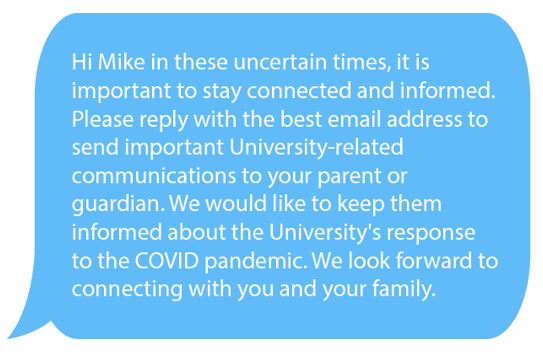

Hybrid Texts
Hybrid texts are a combination of marketing and informational messages. For example, “Your textbook order has shipped. Buy two more for 50% off.” Or in the example below, this message is sent to a student that has previously enrolled, but the message can be perceived as marketing as it’s asking the student to enroll in a future class.
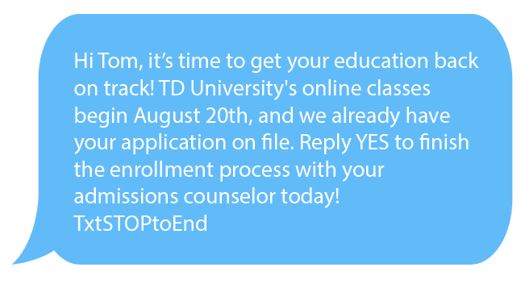

How Should You Obtain Consent to Send a Text Message?
The level of consent required depends on the type of text message. When in doubt, always use the guidelines for marketing texts since they’re the most stringent.
Marketing Texts
To send a marketing text, you’ll need prior express written consent. But that doesn’t mean you need the recipient to physically sign a contract. Due to a federal law called the E Sign Act, completing a web form or texting a keyword to an SMS short code satisfies this requirement. In addition, TCPA requires that the opt-in form:
- Be plain and conspicuous (no pre-checked boxes)
- Be voluntary (not a condition of the sale)
- Disclose the sender’s intent to send marketing messages via an automated system
For example, a poster on campus might say, Text PROMO to 52645 for weekly messages about sales and special events at the ABC University Book Store.”
Once they’ve opted in, your first message must:
- Include the sender’s name
- Disclose possible carrier fees
- Mention the frequency of messages
- Provide a code for help and to opt out
For example, at a minimum, it would say: “Please reply YES to receive weekly updates from ABC University. Standard msg & data rates apply. Reply HELP for help, STOP to cancel.”
Informational Texts
To send an informational text message, you’ll need prior express consent. This means if someone voluntarily discloses their phone number to the sender, they’ve consented to autodialed informational messages.
Although it’s not mandated by TCPA, it’s good practice to follow up with a message that gives them the ability to request help and opt-out of future texts.
Emergency Texts
As long as you have the telephone number on file, there’s no need for consent when sending emergency messages.
Hybrid Texts
If you’re sending a message that’s both marketing and informational, you should always use the strictest form of consent, which is prior express written consent.
How Can Universities and Colleges Manage Risks When Texting?
Keep Records of Text Opt-Outs
According to Adam Bowser, attorney and TCPA expert, higher education institutions should keep records of their text opt-outs for at least four years. That’s the standard statute of limitations for these types of claims. In a recent webinar on Higher Education Texting, Regulations and Best Practices, Bowser spoke with John Wright, TrueDialog CEO, about the importance of tracking text opt-outs. “Having proof of consent is your best defense against a lawsuit.” Bowser also recommended having a “Do Not Call Policy” that explains how your college or university monitors and tracks opt-out requests.
If you don’t already have a system in place to manage your TCPA text messaging compliance, the TrueDialog SMS platform for colleges and universities allows you to easily track consents and opt-out requests. Plus, TrueDialog maintains duplicate opt-out information for extra protection against accidentally texting a contact who has opted-out.
Develop a Texting Policy
A formal written policy can help higher education administrators control how texts are worded, when they’re sent, and who sends them. These steps can all reduce the risk of TCPA violations.
- Define key terms – As you’ve seen from the examples in this article, it’s helpful to understand the different types of texts and what levels of consent they require. What constitutes an emergency? What’s considered promotional? Check out Western Illinois University’s texting policy, which has a “Categories of Messages” section.
- Share text templates – To ensure compliance with required statements (such as “standard text & data rates apply), create text templates so staff can simply fill in the blanks.
- Limit who can text – You can control quality and compliance more easily when you’ve identified a small group of individuals with the authority to send text messages. You could also create an approval process, as described in the Washington State University Texting Policy.
- Require opt-ins for all texts – Even though opt-ins aren’t required for informational texts, you can apply this more stringent requirement for all texts. For example, Western Michigan University has adopted this practice. “Except for emergency communications, only those individuals who have opted-in will receive text messages from the University.”
- Prohibit marketing texts – You can avoid TCPA altogether by not permitting promotional texts. Be sure to define them clearly and offer examples.
The Key Takeaway for TCPA-Compliant Higher Education Text Messaging
You may find that by complying with TCPA, you’ll build the foundation for better relationships with your students and alumni. From their perspective, you’re being considerate and helpful. Just remember to:
- Ask permission before you send a message
- Identify who you are, how often you’ll text, what you’ll text about, and what it might cost
- Offer help and the option to opt-out at any time
Learn how we can help your college or university manage TCPA compliance. Sign up for a demo or get a free trial.
 Salesforce
Salesforce




